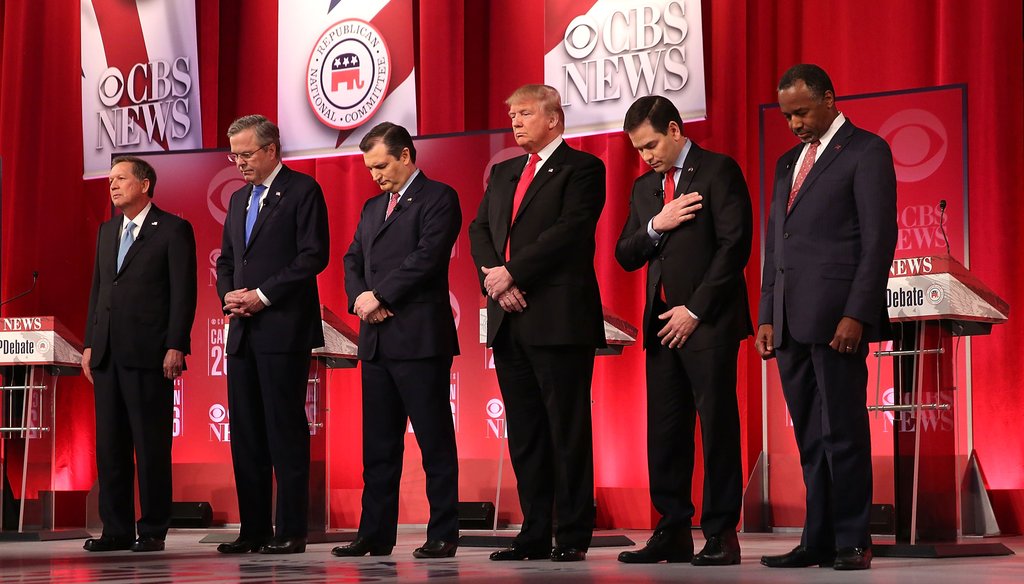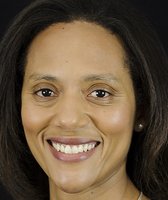Stand up for the facts!
Our only agenda is to publish the truth so you can be an informed participant in democracy.
We need your help.
I would like to contribute

The Republican presidential candidates observe a moment of silence for Supreme Court Justice Antonin Scalia, who died the same day as the CBS debate on Feb. 13, 2016. (Getty)
Six Republican presidential candidates opened Saturday’s CBS debate with a solemn remembrance for the life of Supreme Court Justice Antonin Scalia, who died hours earlier Feb. 13 in Texas.
Then the infighting took over.
Sens. Ted Cruz and Marco Rubio picked up their fight on immigration reform, accusing each other of lying about support for amnesty. Ohio Gov. John Kasich and former Florida Gov. Jeb Bush quibbled over Medicaid spending and expanding Obamacare.
And then billionaire Donald Trump, frank as ever, dismissed Cruz as a "nasty guy" for saying he supported federal funding of Planned Parenthood and drew boos from the audience for insulting Bush’s older brother, former President George W. Bush.
"While Donald Trump was building a reality TV show, my brother was building a security apparatus to keep us safe," Bush replied. "And I'm proud of what he did."
Sign up for PolitiFact texts
Trump interrupted: "The World Trade Center came down during your brother's reign, remember that."
The attacks were fast and furious. But whose punch packed the most truth?
Here’s a rundown of statements we rated from the ninth Republican debate.
Precedent for lame-duck appointments
Most of the candidates argued President Barack Obama should not, as he plans to do, nominate Scalia’s replacement in his last year in office. Rubio drew on the history books to make a case that Obama’s plan would be highly unusual.
"I do not believe the president should appoint someone. And it's not unprecedented," Rubio said. "In fact, it has been over 80 years since a lame duck president has appointed a Supreme Court justice."
This statement rates Mostly False.
The most recent contradiction of this claim would be President Ronald Reagan’s nomination of Justice Anthony Kennedy. Kennedy was nominated in November 1987 and confirmed during Reagan’s final year of office in February 1988.
Reagan’s timeline doesn’t exactly line up with what Obama faces; Reagan had more time between his nomination and the end of his presidency. But it’s hard for us to see how Obama can be considered a lame duck but not Reagan. Both were second-term presidents who knew they would not serve again but did not yet know who their successor would be.
Trump repeats dubious Iraq War claim
Trump aggressively shot down Bush’s attempts to defend brother George W. Bush. When Bush and Rubio said he kept the country safe, Trump said, "The World Trade Center came down during the reign of George Bush. He kept us safe? That is not safe."
Trump also jazzed up a talking point from last Saturday’s debate about him being the only candidate on stage to deliver a vociferous case against the Iraq War.
"I'm the only one on this stage that said, ‘Do not go into Iraq. Do not attack Iraq,’ " Trump said. "Nobody else on this stage said that. And I said it loud and strong. And I was in the private sector. I wasn't a politician, fortunately. But I said it, and I said it loud and clear, ‘You'll destabilize the Middle East.’ "
The newest iteration of this claim rates False.
Trump often repeats this line, and we’ve rated a similar Trump claim Mostly False, because he didn’t appear to take any public position on the war until after the March 2003 invasion. In this more recent version of the statement, he also said he stated his opposition to the war "loud and clear." But the public record of his position is thin.
We only found one instance where Trump discussed the war before it started. On Jan. 28, 2003, just under three months before the invasion, Fox News’ Neil Cavuto asked Trump whether President Bush should be more focused on Iraq or the economy.
Speaking of Iraq, Trump said, "Well, he has either got to do something or not do something, perhaps, because perhaps shouldn't be doing it yet and perhaps we should be waiting for the United Nations, you know. He's under a lot of pressure. I think he's doing a very good job. But, of course, if you look at the polls, a lot of people are getting a little tired. I think the Iraqi situation is a problem. And I think the economy is a much bigger problem as far as the president is concerned."
Trump seems to be skeptical of the mission in Iraq here, and he said the economy should be a higher priority. But he did not say anything that resembles his claim that Bush should not proceed because a war would "destabilize the Middle East."
A single, squishy comment about the looming war does not qualify as "loud and clear" opposition.
Wait, did someone say ‘mooning’?
We doubt anyone saw Trump’s next crack coming.
He tried to call out Bush as a hypocrite for complaining about Trump’s name-calling.
"Two days ago he said he would take his pants off and moon everybody, and that's fine," Trump said. "Nobody reports that."
Bush denied it, saying if his mother was "watching the debate, I didn't say that I was going to moon somebody."
Trump has somewhat of a point about the "mooning" comment. But Bush meant the act as more of a hypothetical, and the press did report it. (That’s how we know he said it.)
So his claim rates Mostly False.
Bush’s mooning quip was the lead quote in a story by the Boston Globe.
Bush wasn’t speaking in front of a crowd. He was one-on-one on his campaign bus with Boston Globe reporter Matt Viser, talking about media coverage of his campaign for a Feb. 6 story.
"I could drop my pants," Bush said in the interview. "Moon the whole crowd. Everybody would be aghast, except the press guys would never notice."
Again, this was a hypothetical quip brought up to make a point about his frustration.
Trump’s statement is misleading, because Bush wasn’t threatening to moon people, and his comment was indeed reported.
Carson’s misquote
Ben Carson invoked one of America’s most notorious foes in his closing statement.
"I, like you, am a member of ‘we, the people,’ " Carson said, addressing the audience. "And we know that our country is heading off the cliff. Joseph Stalin said, ‘If you want to bring America down, you have to undermine three things: our spiritual life, our patriotism and our morality.’ We, the people, can stop that decline."
Carson’s quotation does not check out. We rate it Pants on Fire!
Searches for the quote do not turn up in any history books, scholarly works or primary sources. Mostly it’s just social media sharables with the quote text next to a picture of Stalin.
All signs point to this being a fake quote that has made its way around the Internet.
Our Sources
Listed inside the fact-checks.


















































